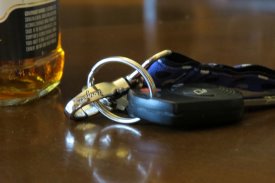Legal Practice Areas
DUI – DWI Attorneys Omaha

When you get pulled over for suspicion of driving under the influence in Omaha, what happens next is somewhat predictable. There will be some variation depending on the circumstances of your case. However, here’s what you can expect:
1. You’ll be asked to perform at least one field sobriety test
Getting arrested for a DUI in Omaha requires evidence that you were driving under the influence. In order to obtain evidence that you were operating a motor vehicle under the influence, the officer who stopped you will require you to submit to at least one of four basic field sobriety tests. These tests include a breathalyzer test, a blood or urine test, and a balance test.
Under Nebraska’s implied consent law, all drivers lawfully arrested for a DUI are required to submit to breath, blood, or urine testing. If you don’t submit to a chemical test, you will be arrested immediately.
The breathalyzer is law enforcement’s preferred test, but if you have a medical condition like emphysema or low lung capacity, you won’t be able to blow hard enough to activate the device. In this case, the officer will ask you to submit to a blood test.
The last resort for testing your BAC will be a urine test. A urine test is generally only used when a blood sample can’t be provided. Saliva tests are rarely used.
If you’re suspected of being under the influence of drugs, the officer will require a blood test since a breathalyzer test can’t detect drugs.
Field sobriety test overview
A field sobriety test serves one purpose: to establish probable cause. If you fail the test, you will be arrested for a DUI. Here’s how field sobriety tests work:
- Breathalyzer. Invented in 1954 by Dr. Robert Borkenstein, the breathalyzer is the most common device used to test blood alcohol content (BAC) in a suspected drunk driver.How a breathalyzer works:
When you breathe into the device, blood flows through your lungs. As you breathe, some of the alcohol in your blood moves across the lung’s air sacs (alveoli). This movement causes the alcohol to evaporate into the air and that air is captured by the breathalyzer. Your exhaled air is then analyzed to find the concentration of alcohol. It’s important to note that alcohol is not digested or chemically changed in the bloodstream. What you breathe out is an accurate representation of what’s in your blood.The concentration of alcohol detected from your breath is calculated by a ratio of 2,100 to 1; breath to blood. In other words, 2,100 milliliters of alveolar air contains as much alcohol as 1 milliliter of blood.Although the breathalyzer calculates BAC based on the average amount of blood in the human body, it’s considered a reliable way to measure the alcohol in blood. It’s not perfect, but it’s not a test you want to fail. Failing a breathalyzer test will result in your arrest.
Be aware that some law enforcement officers use a portable breathalyzer rather than the larger unit. Test results from portable breathalyzers are not admissible in court.
- Balance tests. You might be asked to walk in a straight line, close your eyes and touch your nose with your index fingers, or close your eyes and estimate when 30 seconds have passed.Balance testing is based on the idea that three things are necessary to maintain balance: vision, knowing where your limbs are in space, and equilibrium. Alcohol changes the perception of spatial relationships and alters vision and equilibrium. The concept is that a drunk person won’t have proper balance with their eyes closed, and won’t know where their arms are with closed eyes. A balance test gives law enforcement clues about your state of sobriety from the way your body sways, how well (and fast) you follow directions, and your ability to estimate time.
- A blood, urine, or saliva test. Alcohol can be detected in urine for 3-5 days through the ethyl glyconoride metabolite, or 10-12 hours via traditional testing. Alcohol can be detected in blood for up to 12 hours, and saliva can test positive for alcohol for 1-5 days.
If you fail any field sobriety test, you will be arrested on suspicion of driving under the influence. In Nebraska, you can receive a DUI even if your BAC is within the legal limits if you are impaired.
2. You might end up in jail
A first DUI offense in Omaha can get you 10 days in jail; a second offense carries a minimum of 30 days up to 90 days in jail; and a third offense brings a minimum of 90 days to 180 days in jail.
3. Your driver’s license will be suspended
Being arrested for a DUI in Omaha generally results in an immediate suspension of your driver’s license. Sometimes people are given a temporary license valid for 15 days. Depending on previous offenses, you could have your license revoked for up to 15 years.
Your license will be suspended for one year if you refuse to take a breathalyzer test; 180 days if you fail a breathalyzer test on your first offense; and one year if you fail a breathalyzer test and you’re on your second offense within 15 years.
4. You have the opportunity to request an administrative hearing
Within ten days of being served a notice that your license is being suspended, you can request an administrative hearing to review your DUI charge and your license suspension.
You might be able to apply for a hardship exemption, which would require the installation of an ignition interlock device. Consult with a DUI attorney in Omaha to find out how you can qualify for an interlock device.
5. You might be required to use an ignition lock device
An ignition interlock device is a breathalyzer hard-wired to your engine’s ignition system. With the device installed, you have to pass the breath test to start your car. However, ignition interlock devices are programmed for a much lower limit than the state standard of 0.08%. The interlock limit varies by state, but it’s usually between 0.02%-0.04%.
Ignition interlock devices may ask you to provide breath samples while you’re driving at random times. If alcohol is detected during one of these tests, your car won’t shut off but you’ll be given a signal to pull over.
6. You’ll face fines
Being convicted of a DUI in Omaha comes with hefty fines from the Nebraska DMV and the court. For a first offense, you’ll generally pay $500; a second offense can cost up to $1,000; and a third offense usually costs $1,000.
7. You’ll need to complete an alcohol assessment
After a DUI in Omaha, the court will require you to be evaluated. A court-ordered substance abuse evaluation is designed to determine the presence and extent of your alcohol or drug problem. The assessment is completed by a certified treatment provider. If the provider determines a problem exists, a treatment plan will be developed for you.
You’ll be responsible for the cost of the assessment as well as your treatment program. Assessments generally cost $100-$150. Treatment programs are expensive, and in rare cases are covered by insurance.
8. You’ll need to face your situation honestly
Perhaps the hardest part of being arrested for a DUI is facing your situation honestly. You’re facing serious criminal charges, and there will be consequences. Your family life will be disrupted, especially if your license was suspended or you’re sentenced to time in jail. You may also need to change jobs, or quit your job to go into a residential treatment center.
9. You’ll need to contact a DUI attorney in Omaha
Contacting a DUI attorney should be the first move you make. A DUI is a serious criminal charge, and depending on the other circumstances in your case, you might be overwhelmed. An experienced DUI attorney can help you stay grounded.
What Our Clients Say

Helped me to choose which course would be best!
From day 1 Frank was able to give me several different options and helped me to choose which course would be best for me in my family law case. Everything was done quickly and without problem. I walked away from court and what seemed like a never ending battle completely satisfied with the outcome. I would recommend Frank and his firm to anyone looking for an attorney who really knows their stuff and cares about their clients.
Grace

